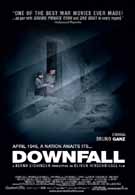Downfall is a landmark in the history of German cinema: the first German film to approach the subject of Hitler and the Nazi party since the 1956 Der Letste Akt (The Last Act), a look at the notorious dictator’s last ten days from the viewpoint of a guardsman. Similarly, Downfall chronicles the Third Reich’s collapse amid bombing and treachery, except the film is seen through the eyes of several followers holed up in Hitler’s bunker. The result is a merciless education in the kind of stranglehold Adolf Hitler had on those closest to him.
The film opens in November 1942, with a group of young women, all candidates to become the Fuerhrer’s personal secretary, being escorted to his personal headquarters in Eastern Prussia. Among them is Traudl Junge (Alexandra Maria Lara), a 22-year old from Munich who gets the job on the spot. Fast forward nearly three years. The war is nearing its end and Germany its defeat, most of the country is in ruins because of its dictator’s stone-fisted commandments, the Russian army has them surrounded, and Hitler (Bruno Ganz) and most of the Nazi army have retreated to a bunker system in Berlin. Hitler's concubine Eva Braun (Juliane Kohler) is preparing for his 56th birthday and his associates (Heinrich Himmler, played by Ulrich Noethen; Josef Goebbels, played by Ulrich Matthes; and Albert Speer, played by Heino Ferch) are urging the stubborn dictator to flee, but he refuses.
Downfall is not about Hitler the man, it’s about Hitler the leader and the consequences he and his followers face. The film focuses on the German military’s blind loyalty to the Fuerher. In the bunker, he appears practically godlike, as we can all be sure he seemed to his followers in real life. Seconds-in-command, friends, and various underlings throw themselves at his knees, begging for salvation and guidance. More importantly, these people believe in their leader, and many dedicate themselves to fighting with him until the very end, even though it’s clearly a lost cause. This is what raises Downfall a cut above a standard portrait of the one of the most notorious human beings in history.
Hitler himself is shown histrionically accusing all those around him of either undermining or betraying him, only occasionally taking the opportunity to figure out where his leadership might have failed and to accept that the battle is over. Bruno Ganz is commanding as the demented dictator, hunched over, wringing his hands, and twitching in anger. Based on such mannerisms, the recreation feels surprisingly deep, reminiscent of Anthony Hopkins in Nixon, even down to the furrowed brows and fumfering speech.
Based in part on the memoirs of the real-life Traudl Junge, whose experiences were the basis of the 2002 documentary Blind Spot: Hitler's Secretary, The film offers a documentary-like view, with Director Oliver Hirschbiegel taking no sides to elaborately recreate an era’s end, following the soldiers as they brief subordinates and higher-ranking officials on the doomed situation. As bombs fall, the soldiers meet in a futile attempt to mobilize more troops, while trying to party their troubles away.
Because the story takes place so late in the war (thus, after the worst of the Nazi-inflicted atrocities), the approach is almost like that of last year’s The Passion (only the main character is the polar opposite of that film’s central figure): so does this film assume you already understand the history of the Nazi party and what has driven them into this predicament, just as The Passion assumed you already knew who Jesus Christ was and why he had become so hated by some before his crucifixion.
Perhaps Downfall would have been better suited as a documentary than as an actual film. The focus is so clearly on the history and not its themes, though the result probably would have been the same. Nonetheless, it’s still a blitzkrieg of a story: attacking with full force at a lightning pace and never letting go until the final bullets are shot. By the end of its 155-minute running time, you’ll feel exhausted, enlightened, and chilled, but the war will be over, and it will all have been worthwhile.











